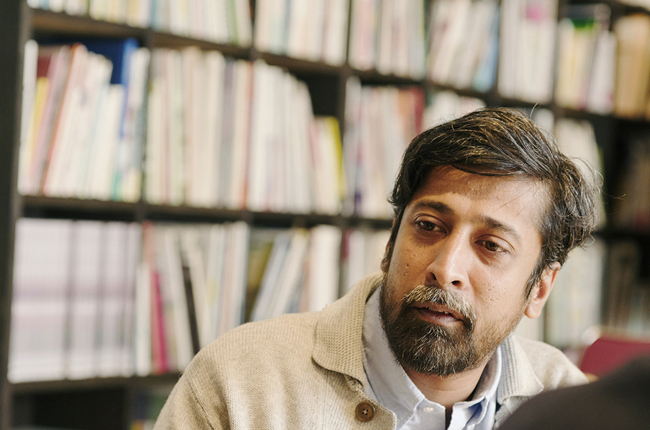
ASIA HUNDREDS is a series of interviews and conference presentations by professionals with whom the Japan Foundation Asia Center works through its many cultural projects.
By sharing the words of key figures in the arts and cultures in both English and Japanese and archiving the "present" moments of Asia, we hope to further generate cultural exchange within and among the regions.
Drama School in Thrissur
Tadashi Uchino (hereinafter Uchino): Let us start from speaking a little bit about where you're from. That is, you are from Kerala in India. The readers, however, perhaps have only a vague idea of what Kerala is, or for that matter, what India is. I'm sure they know where India is geographically, but the multicultural context of India is not necessarily well known. Can you tell me a little bit about that, where you are from and how you got involved in theater?
Sankar Venkateswaran (hereinafter Sankar): India is very diverse in terms of culture and I come from Kerala, which is in the southwest of India. Historically, it has been distinctly different from the rest of the country. It has had, for example, very strong cultural connections with the Arab world. It has had Christianity as well as Judaism from 1st century CE, there are Cochin Jews, plus the various cultural entities coexist in Kerala side by side. I come from the city called Calicut, which is also the place which marked the beginning of the European imperialism in Asia – Vasco da Gama arrived and landed in Calicut. That's my native place.
Uchino: How big is the city?
Sankar: The population is about 5.5 lakh (550,000).
Uchino: Okay. Go on.
Sankar: My father being a bank manager, I had to shift every 3 years, and I had to change schools. There was always the sense of displacement. I don't have much associations or connections from my childhood. And, I ended up in Calicut itself for my graduation, my degree, and my subject was physics because I was very interested in astrophysics. But to my disappointment, in my 3-year course in physics, there was only one chapter, one lesson, on astrophysics. The rest was all uninteresting for me like optics and thermodynamics and nuclear physics. So, I found myself spending more and more time in the theater club. And then slowly it became my primary interest. So, I stopped attending classes, and I spent all my time watching rehearsals, rehearsing, writing plays, directing, and up to a point where I could not fulfill my requirements for attending the exams. So, I was expelled from my college.
Uchino: What is the language in Calicut?
Sankar: The language is Malayalam but we did theater in Malayalam, English, and Hindi. There are these university competitions where English and Malayalam are more prominent.
Uchino: And, where are they from and what are they doing? I mean are they doing the modern western plays or the more traditional?
Sankar: Usually, we write our own plays and make our own plays. And, maybe some one-act plays from Chekhov. These were the starting points.
Uchino: And you said you were expelled from school and after that?
Sankar: There is a drama school in Thrissur where they offer a formal degree in theatre. I couldn't just be doing theatre in this amateur context. I had to convince my parents with something more formal and structured as a part of a university program.
Uchino: When you started making theatre, were you acting or directing or were you writing? Or were you doing everything?
Sankar: Almost everything except for acting, including pulling the curtains, carrying things yeah all of that.
Uchino: Of course!
Sankar: I was most interested in directing.

Uchino: And, you went to the drama school in Thrissur. What did you learn there?
Sankar: Yes, there was a theater department. Calicut University has this – not the main campus but they have this small campus in Thrissur where they have an Economics Department and a Theater Department.
It was a 6-semester course, so starting with ancient Indian Sanskrit drama, then European theater, then Malayalam theater, then modern western theater and so on.
Uchino: Was it more of the academic stuff rather than...
Sankar: As well as practical.
We had to mount productions, three diploma productions, and also we got to work with teachers like Abhilash Pillai*1 there and one of his production was invited by the Japan foundation, Saketam. I was part of that.
*1 Abhilash Pillai is an Indian theater director, originally from Kerala in South India. Having studied directing and stage design at the National School of Drama (NSD) in Delhi and RADA in London, he now teaches at NSD.
Uchino: The production itself was invited to Tokyo, in 2001, right?
Sankar: Yes. Tokyo and Fukuoka.
Uchino: I didn't see it but I saw that video. I remember it was a very powerful production. And you completed three-year undergraduate course. And after that?
- Next Page
- TTRP in Singapore






